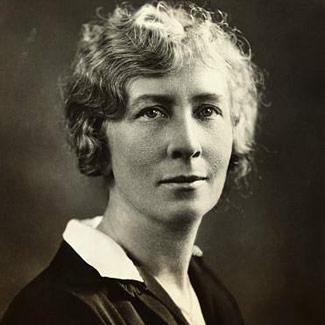Lillian Moller Gilbreth (Industrial Engineer)
 Lillian Moller Gilbreth, PhD, (May 24, 1878 – January 2, 1972) was one of the first working female engineers to hold a PhD.
Lillian Moller Gilbreth, PhD, (May 24, 1878 – January 2, 1972) was one of the first working female engineers to hold a PhD.
She is arguably the first true industrial/organizational psychologist. She and her husband Frank Bunker Gilbreth, Sr. were pioneers in the field of industrial engineering.
Their interest in time and motion study may have had something to do with the fact that they had an extremely large family.
The books Cheaper by the Dozen and Belles on Their Toes, written by their children Ernestine and Frank Jr., are the story of their family life with their twelve children.
She served as an advisor to Presidents Hoover, Roosevelt, Eisenhower, Kennedy and Johnson on matters of civil defense, war production and rehabilitation of the physically handicapped.She and husband Frank have a permanent exhibit in the Smithsonian National Museum of American History and her portrait hangs in the National Portrait Gallery.
She graduated from the University of California, Berkeley with a BA (1900) and MA (1902). Lillian completed her dissertation to obtain her Ph.D from the University of California, but did not receive the degree because she was not able to complete the residency requirements. Her dissertation was titled The Psychology of Management. She later earned a Ph.D from Brown University in 1915, having written a dissertation. It was the first degree granted in industrial psychology. She also received 22 honorary degrees from such schools as Princeton University, Brown University, and the University of Michigan.
In her work, Lillian Gilbreth combined the perspectives of an engineer, a psychologist, a wife, and a mother; she helped industrial engineers see the importance of the psychological dimensions of work. She became the first American engineer ever to combine a synthesis of psychology and scientific management.
She and her husband were certain that the revolutionary ideas of Frederick Winslow Taylor, as Taylor formulated them, would be neither easy to implement nor sufficient; their implementation would require hard work by both engineers and psychologists to make them successful. Both Lillian and Frank Gilbreth believed that scientific management as formulated by Taylor fell short when it came to managing the human element on the shop floor. The Gilbreths helped formulate a constructive critique of Taylorism; this critique had the support of other successful managers.
On top of having twelve children, writing books, helping companies with their management skills, managing women consumers, Lillian was instrumental in the design of a desk, that she designed in 1933 in cooperation with IBM for display at the Chicago World’s Fair.